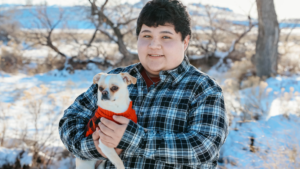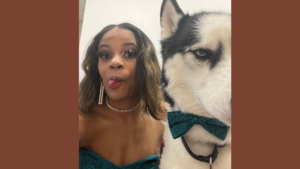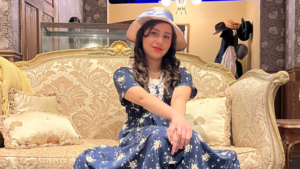This guest post is by Athena Callis, a young woman who attends George Mason University. She is an advocate for the Spring 2025 Making a Difference Autism Scholarship via the nonprofit KFM Making a Difference started by me, Kerry Magro. I was nonverbal till 2.5 and diagnosed with autism at 4 and you can read more about my organization here.
Autistics on Autism the Next Chapter: Stories You Need to Hear About What Helped Them While Growing Up and Pursuing Their Dreams was released on Amazon on 3/25/25 and looks at the lives over 75 Autistic adults. 100% of the proceeds from this book will go back to supporting our nonprofits many initiatives, like this scholarship program. Check out the book here.
I didn’t find out I was diagnosed with autism until the fourth grade. I asked my mom if something was wrong with me after I was called mental by a classmate. I knew deep down I wasn’t treated like the other kids for some reason. Finally, my mom gave me an answer. She showed me a video about autism and explained it best to a younger me. Initially, I was happy and felt relieved. I understood an aspect of myself that I didn’t know before, and it made me feel special. After school the next day, I confided in my dad that I knew I was autistic. I asked him if he already knew about it, but he offered no response. I struggled a lot throughout elementary and middle school. It seemed some teachers thought I was simply lazy and refused to understand basic math or science. I felt my dad thought the same. Whenever we did math homework together at the dining room table, it would end with him getting frustrated by the fact that I couldn’t understand 10 x 5, and me feeling utterly embarrassed. He would remind me he loved me, but I couldn’t help but feel like a failure at the end of the day. I wanted to be like other kids. I wanted to understand multiplication tables and fractions. I wanted to feel like I had a chance of succeeding in high school. I thought being in special ed classes was holding me back from being like my classmates, and I decided to try to do more to improve myself. The first step in that journey was developing an interest in reading. I can clearly remember the first book that I actually enjoyed, which was a graphic novel, Sisters by Raina Telgemeier. At first, I was drawn to the brightly colored panels and the white and black speech bubbles. But then I actually read the novel, and I fell in love with the story of two sisters growing up together and learning how to understand each other. Sisters taught me that reading can be fun.
Graphic novels were an important part of my early development because they visualized the story enough for me to understand it. Because of my love for graphic novels, I started to read more books in my English classes. My most memorable one was The Giver by Lois Lowry, my first chapter book. I also gave myself more time to focus on my math work. I really could understand the questions better without someone breathing down my neck. By the time I reached seventh grade, I continued to thrive from weekly speech therapy and occupational therapy, and I had reached a point where I required fewer special education pull-out services.
However, in 2020, the pandemic hit me hard, and things started to spiral out of control. My mental health was in disarray, and I felt less motivated to continue to participate in my special education services. My special education caseworker I had for several years, abruptly changed to a different one, who also served as my new speech therapist. It was rough for several reasons, including our meetings being over Zoom and the fact that the caseworker/speech therapist would skip the majority of those meetings, stating that I was too “difficult”. It felt as though I had been betrayed. My well-being during the pandemic was also impacted by the death of George Floyd and the protests that occurred following his death. It made me realize how deeply the United States does not care for black people. I felt more uncertain about my future, and I couldn’t imagine myself making it to high school. I thought I would be better off with everything ending at middle school because I didn’t want to deal with the fact that I was black and autistic, let alone the fact that I would have to grow up soon and manage myself in the world.
Thankfully, things did get better. The issues I was experiencing in school were resolved. I was able to meet my speech and occupational therapy goals before I graduated from middle school, and reduce the amount of pull-out services I required. This greatly boosted my confidence. I felt assured I could successfully manage taking classes in high school. I felt more comfortable advocating for myself now as an individual with autism. I am glad I gave myself an opportunity to grow as a black person with autism, as well as advocate for my education, and to be a part of a classroom environment.
Kerry Magro, a professional speaker and best-selling author who is also on the autism spectrum started the nonprofit KFM Making a Difference in 2011 to help students with autism receive scholarship aid to pursue a post-secondary education. Help us continue to help students with autism go to college by making a tax-deductible donation to our nonprofit here.
Also, consider having Kerry, one of the only professionally accredited speakers on the spectrum in the country, speak at your next event by sending him an inquiry here. If you have a referral for someone who many want him to speak please reach out as well! Kerry speaks with schools, businesses, government agencies, colleges, nonprofit organizations, parent groups and other special events on topics ranging from employment, how to succeed in college with a learning disability, internal communication, living with autism, bullying prevention, social media best practices, innovation, presentation best practices and much more!














